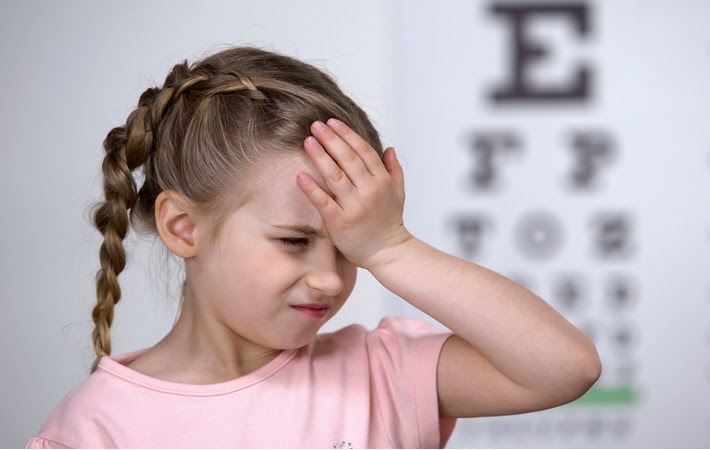Myopia, or nearsightedness, affects 30% of the population. It is one of the most common eye conditions in the world. Like other refractive errors, myopia causes objects at a certain distance to become blurry. No single home remedy can fully treat myopia. While corrective lenses or surgery remain the most effective solutions, certain natural methods may help slow its progression. If you think you are experiencing myopia, book an appointment for an eye examination with one of our optometrists to get diagnosed.
What is Myopia?
Myopia is a common vision problem that allows you to clearly see things close to you, but objects far away will be blurry. Myopia occurs due to the shape of your eye causing light to refract incorrectly, making it focus before it reaches your retina instead of focusing at the retina.
Myopia can develop rapidly or quite slowly, and it is often hereditary. The best way to confirm if you are experiencing myopia is to receive a comprehensive eye examination.
Many children can develop myopia early on in their life, severely affecting their quality of life and ability to learn. Myopia can put your child at risk of developing eye diseases like retinal detachment, glaucoma, cataracts, and macular degeneration, so it is important to consider getting your child examined for refractive errors.
Symptoms
- Blurry vision when looking at distant objects
- The need to squint or partially close the eyelids to see clearly
- Headaches caused by eyestrain
- Difficulty seeing while driving a vehicle, especially at night
If you think that your child has myopia, some signs that they will need treatment are:
- Persistently squint
- Need to sit closer to screens or the front of a classroom
- Seem to be unaware of distant objects
- Blink excessively
- Rub their eyes frequently
Causes
Myopia is a refractive error, meaning that light does not refract properly through your cornea or lens which causes the light to focus at a different point other than on the retina. If your cornea or lens isn’t evenly and smoothly curved, you will experience a refractive error. Nearsightedness occurs when your eyeball is longer than normal or your cornea is curved too steeply.
Complications
Complications due to myopia can range from subtle to severe. Some complications you may run into as a result of myopia are:
- Reduced quality of life – you may find it more difficult to perform everyday tasks when afflicted with myopia
- Eyestrain – myopia can cause discomfort due to squinting and overworking your eyes
- Impaired safety – things like driving and operating machinery become hazardous if your myopia is not being treated properly
- Financial burden – correcting myopia involves buying corrective lenses or undergoing expensive surgery
- Other eye problems – if you have myopia it puts you at an increased risk of retinal detachment, glaucoma, cataracts, and myopic degeneration
How Myopia is Diagnosed
Myopia is usually diagnosed through a refraction assessment during a comprehensive eye exam. A refraction assessment will determine if you have vision problems like nearsightedness, farsightedness, astigmatism, or presbyopia. An optometrist will use various instruments and ask you to look through several lenses to test your distance and close-up vision during a refraction assessment.

5 Natural Treatments for Myopia
There is no catch-all home remedy to treat myopia. Corrective lenses or surgery are the most effective treatments for myopia, but some natural treatment options can help slow the progression of myopia.
1. Increase the Time You Spend Outside
Spending more time outdoors during adolescence and your early adult years may decrease the lifetime risk of nearsightedness. This may be due to the sun’s ultraviolet rays changing the molecular structure of the sclera and cornea and help maintain a normal shape.
2. Protect Your Eyes from the Sun
Wearing sunglasses will protect your eyes from harmful ultraviolet rays and help slow the progression of myopia if you spend a lot of time outdoors.
3. Eat Healthily
Try to eat plenty of leafy greens, vegetables, and fruits. Your eyes benefit if you also include fish high in omega-3 fatty acids, such as tuna and salmon, in your diet.
4. Reduce Eyestrain
Taking breaks from looking at screens and letting your eyes get proper rest can help slow the progression of myopia.
5. Don’t Smoke
Smoking has many detrimental effects, and it can negatively affect your eyesight and those around you. Avoid smoking to slow the progression of myopia.
Get Help With Myopia Today
Myopia doesn’t just cause challenges focusing on objects that are far away; it has the potential to have a significant impact on your vision and overall eye health. Make sure to schedule routine eye exams with your eye doctors to watch for signs of myopia and take action against myopia if it appears in your family.





